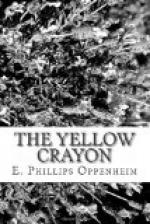“It is the very thing to excite suspicion—flight abroad,” she objected.
“Your flight,” he said coolly, “will be looked upon from a different point of view, for Reginald Brott must follow you. It will be an elopement, not a flight from justice.”
“And in case I should decline?” Lucille asked quietly.
The Prince shrugged his shoulders.
“Well, we have done the best we can for ourselves,” he said. “Come, I will be frank with you. There are great interests involved here, and, before all things, I have had to consider the welfare of our friends. That is my duty! Emil Sachs by this time is beyond risk of detection. He has left behind a letter, in which he confesses that he has for some time supplemented the profits of his wine-shop by selling secretly certain deadly poisons of his own concoctions. Alarmed at reading of the death of Duson immediately after he had sold a poison which the symptoms denoted he had fled the country. That letter is in the hands of the woman who remains in the wine-shop, and will only be used in case of necessity. By other means we have dissociated ourselves from Duson and all connection with him. I think I could go so far as to say that it would be impossible to implicate us. Our sole anxiety now, therefore, is to save you.”
Lucille rose to her feet.
“I shall go at once to my husband,” she said. “I shall tell him everything. I shall act on his advice.”
The Prince stood over by the door, and she heard the key turn.
“You will do nothing of the sort,” he said quietly. “You are in my power at last, Lucille. You will do my bidding, or—”
“Or what?”
“I shall myself send for the police and give you into custody!”
CHAPTER XXXV
The Prince crossed the hall and entered the morning-room. Felix was there and Raoul de Brouillac. The Duchess sat at her writing-table, scribbling a note. Lady Carey, in a wonderful white serge costume, and a huge bunch of Neapolitan violets at her bosom, was lounging in an easy-chair, swinging her foot backwards and forwards. The Duke, in a very old tweed coat, but immaculate as to linen and the details of his toilet, stood a little apart, with a frown upon his forehead, and exactly that absorbed air which in the House of Lords usually indicated his intention to make a speech. The entrance of the Prince, who carefully closed the door behind him, was an event for which evidently they were all waiting.
“My good people,” he said blandly, “I wish you all a very good-morning.”
There was a little murmur of greetings, and before they had all subsided the Duke spoke.
“Saxe Leinitzer,” he said, “I have a few questions to ask you.”
The Prince looked across the room at him.
“By all means, Duke,” he said. “But is the present an opportune time?”




